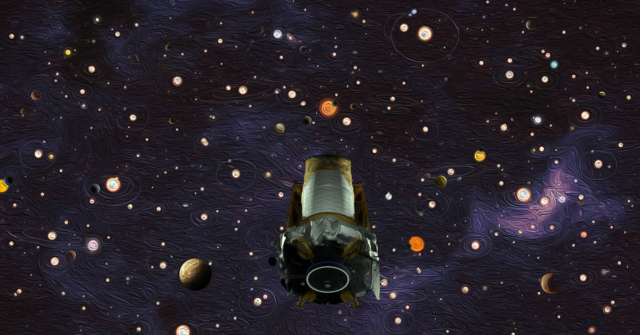The Kepler Space Telescope is dead. Long live the fucking Kepler Space Telescope!
Folks, the Kepler Space Telescope is dead. However, it shall not be forgotten by any means. The telescope is responsible for finding, conservatively, a fuck-ton of exoplanets. Therefore, we must remember it always. Dead, but alive forever.
The Verge:
This afternoon, NASA officially bid farewell to the Kepler Space Telescope, a pioneering spacecraft that helped discover thousands of planets beyond our Solar System. After years of service that extended long beyond its initial mission, the spacecraft finally ran out of fuel.
Kepler was a marvel of engineering. It detected planets by looking for their transits, which are the small dips in the light of a star as a planet passed between that star and Earth.
““Like trying to detect a flea crawling across a car headlight, when the car was 100 miles away””“It was like trying to detect a flea crawling across a car headlight, when the car was 100 miles away,” William Borucki, retired Kepler principal investigator said in a press conference today.
Kepler and its follow-up mission, K2, helped researchers discover the planets are incredibly common. Together, the two missions discovered and confirmed the existence of 2,681 planets and identified many more blips around distant stars that could be planets but are still awaiting confirmation.
Luckily, another telescope is already in space ready to continue Kepler’s work. NASA launched the Transiting Exoplanet Survey Satellite (aka TESS) earlier this year. It took its first science picture in August, and by September, it had already identified two potential planets.
TESS has a long way to go before it catches up to Kepler. But someday in the not-too-distant future, TESS or another future telescope will eventually usurp Kepler’s position as the undisputed ruler of planet-discovering devices. More powerful telescopes will send back images that are crisper and more detailed than Kepler could take. Advances in computing will help scientists pick out transiting planets from data gathered long after Kepler’s death. More worlds will be found, and our image of the galaxy will keep resolving into a sharper, beautiful focus.
Kepler’s legacy is the constant expansion of our understanding of the universe. “Now, because of Kepler, what we think about the universe has changed,” says Paul Hertz, the astrophysics division director at NASA.




